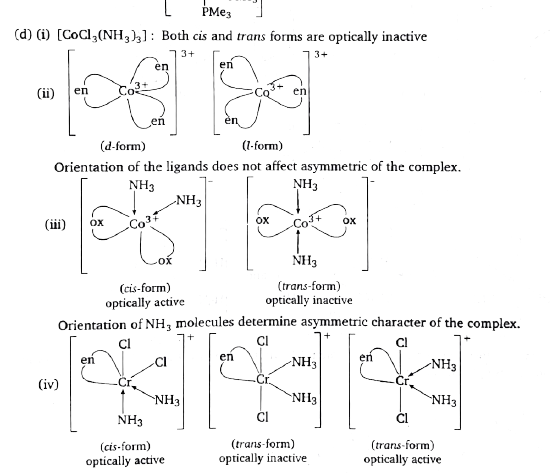Complex compounds(s) which is optical active and does ot dpeend upon the orientation of the ligands around metal cation:
(i) [CoCl3(NH3)3]
(ii) [Co(en)3]Cl3
(iii) [Co(C2O4)2(NH3)2]−
(iv) [CrCl2(NH3)2(en)]+
(ii), (iii) and (iv)
(i), (ii) and (iv)
(ii) and (iv)
only (ii)
The correct Answer is:A

Hence, orientation of ligands determine asymmetric nature of the complex.
Topper's Solved these Questions
- CO-ORDINATION COMPOUNDSBOOK - VK JAISWALCHAPTER - CO-ORDINATION COMPOUNDSEXERCISE - ONE OR MORE ANSWERS IS/ARE CORRECT
72 Videos
- CO-ORDINATION COMPOUNDSBOOK - VK JAISWALCHAPTER - CO-ORDINATION COMPOUNDSEXERCISE - MATCH THE COLUMN
36 Videos
- CHEMICAL BONDING (BASIC)BOOK - VK JAISWALCHAPTER - CHEMICAL BONDING (BASIC)EXERCISE - Level 3 (Passive 11)
6 Videos
- d-BLOCK ELEMENTSBOOK - VK JAISWALCHAPTER - d-BLOCK ELEMENTSEXERCISE - SUBJECTIVE PROBLEMS
6 Videos
Similar Questions
Knowledge Check
Complex compounds(s) which is optical active and does ot dpeend upon the orientation of the ligands around metal cation:
(i) [CoCl3(NH3)3]
(ii) [Co(en)3]Cl3
(iii) [Co(C2O4)2(NH3)2]−
(iv) [CrCl2(NH3)2(en)]+AII,IIIand IvBI,Iiand IvCII and IvDOnly IIWhich of the following can exhibit geometrical isomerism ?
(i) [Co(NH3)4Cl2] (ii) [Co(en)3]Cl2 (iii) [Co(en)2(NO2)Cl]SCN (iv) [Co(NH3)6][Cr(CN)6]A(i), (ii), (iii)B(i), (iii)C(ii), (iv)D(i), (ii),(iv)Which of the following will have three stereoisomeric forms :-
(i) [Cr(NO3)3(NH3)3] (ii) K3[Co(C2O4)3]
(iii) K3[CoCl2(C2O4_(2)] (iv) [CoBrCl(en)2]Aiii, ivBI, ii and ivCOnly ivDAll
Draw all the isomers (geometrical and optical) of:
(i) [CoCl2(en)2]+
(ii) [Co(NH3)Cl(en)2]2+
(iii) [Co(NH3)2Cl2(en)]+
View SolutionThe no. of complexes showing and mer isomerism
(A) [Co(NH3)3Cl3] (B) [Co(en)3]+3
[Co(gly)3]
(D) [Co(NH3)2(H2O)2Cl2]
(E) [Fe(dipy)3]+2 (F)[Fe(o−phen)3]+2
View SolutionDraw the structures of optical isomers of:
(i). [Cr(C2O4)3]3−
(ii). [PtCl2(en)2]2+
(iii). [Cr(NH3)2Cl2(en)]⊕
View SolutionWhich of the following will have three stereoisomeric forms?
(i) [Cr(NO3)3(NH3)3]
(ii) K3[Co(C2O4)3]
(iii) K3[CoCl2(C2O4)2]
(iv) [CoBrCl(en)2]
View SolutionWhich of the following will have three stereoisomeric forms?
(i) [Cr(NO3)3(NH3)3]
(ii) K3[Co(C2O4)3]
(iii) K3[CoCl2(C2O4)2]
(iv) [CoBrCl(en)2]
View Solution
